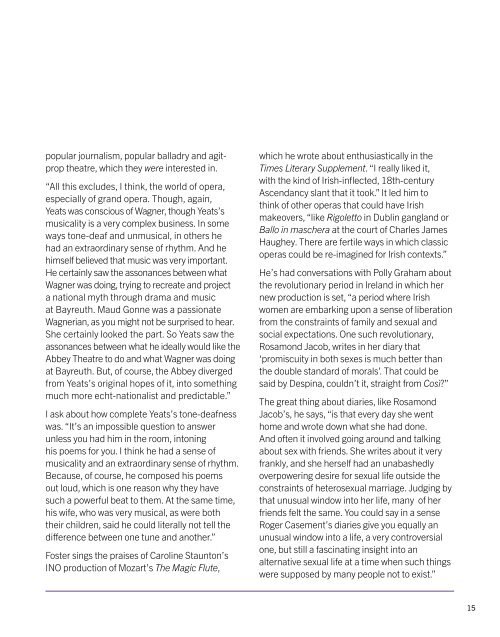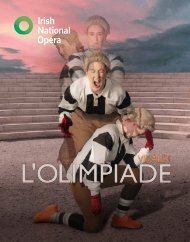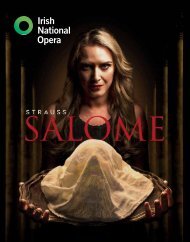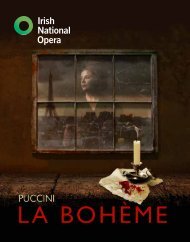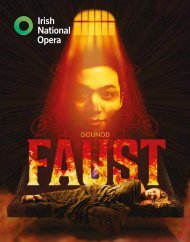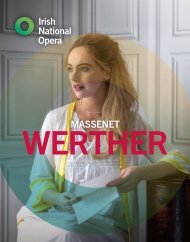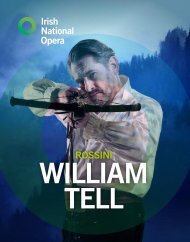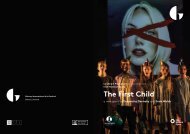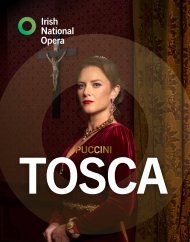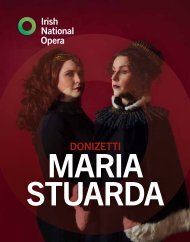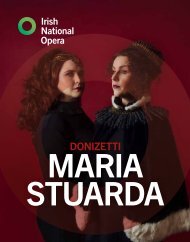Cosí fan tutte programme book 2023
Irish National Opera
Irish National Opera
You also want an ePaper? Increase the reach of your titles
YUMPU automatically turns print PDFs into web optimized ePapers that Google loves.
popular journalism, popular balladry and agitprop<br />
theatre, which they were interested in.<br />
“All this excludes, I think, the world of opera,<br />
especially of grand opera. Though, again,<br />
Yeats was conscious of Wagner, though Yeats’s<br />
musicality is a very complex business. In some<br />
ways tone-deaf and unmusical, in others he<br />
had an extraordinary sense of rhythm. And he<br />
himself believed that music was very important.<br />
He certainly saw the assonances between what<br />
Wagner was doing, trying to recreate and project<br />
a national myth through drama and music<br />
at Bayreuth. Maud Gonne was a passionate<br />
Wagnerian, as you might not be surprised to hear.<br />
She certainly looked the part. So Yeats saw the<br />
assonances between what he ideally would like the<br />
Abbey Theatre to do and what Wagner was doing<br />
at Bayreuth. But, of course, the Abbey diverged<br />
from Yeats’s original hopes of it, into something<br />
much more echt-nationalist and predictable.”<br />
I ask about how complete Yeats’s tone-deafness<br />
was. “It’s an impossible question to answer<br />
unless you had him in the room, intoning<br />
his poems for you. I think he had a sense of<br />
musicality and an extraordinary sense of rhythm.<br />
Because, of course, he composed his poems<br />
out loud, which is one reason why they have<br />
such a powerful beat to them. At the same time,<br />
his wife, who was very musical, as were both<br />
their children, said he could literally not tell the<br />
difference between one tune and another.”<br />
Foster sings the praises of Caroline Staunton’s<br />
INO production of Mozart’s The Magic Flute,<br />
which he wrote about enthusiastically in the<br />
Times Literary Supplement. “I really liked it,<br />
with the kind of Irish-inflected, 18th-century<br />
Ascendancy slant that it took.” It led him to<br />
think of other operas that could have Irish<br />
makeovers, “like Rigoletto in Dublin gangland or<br />
Ballo in maschera at the court of Charles James<br />
Haughey. There are fertile ways in which classic<br />
operas could be re-imagined for Irish contexts.”<br />
He’s had conversations with Polly Graham about<br />
the revolutionary period in Ireland in which her<br />
new production is set, “a period where Irish<br />
women are embarking upon a sense of liberation<br />
from the constraints of family and sexual and<br />
social expectations. One such revolutionary,<br />
Rosamond Jacob, writes in her diary that<br />
‘promiscuity in both sexes is much better than<br />
the double standard of morals’. That could be<br />
said by Despina, couldn’t it, straight from Così?”<br />
The great thing about diaries, like Rosamond<br />
Jacob’s, he says, “is that every day she went<br />
home and wrote down what she had done.<br />
And often it involved going around and talking<br />
about sex with friends. She writes about it very<br />
frankly, and she herself had an unabashedly<br />
overpowering desire for sexual life outside the<br />
constraints of heterosexual marriage. Judging by<br />
that unusual window into her life, many of her<br />
friends felt the same. You could say in a sense<br />
Roger Casement’s diaries give you equally an<br />
unusual window into a life, a very controversial<br />
one, but still a fascinating insight into an<br />
alternative sexual life at a time when such things<br />
were supposed by many people not to exist.”<br />
15


